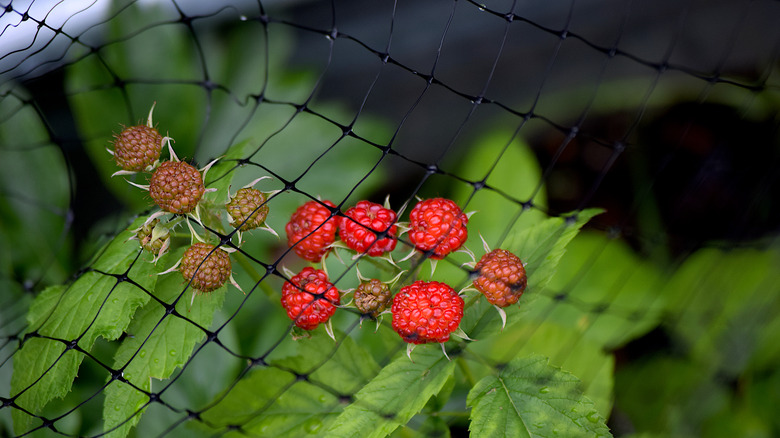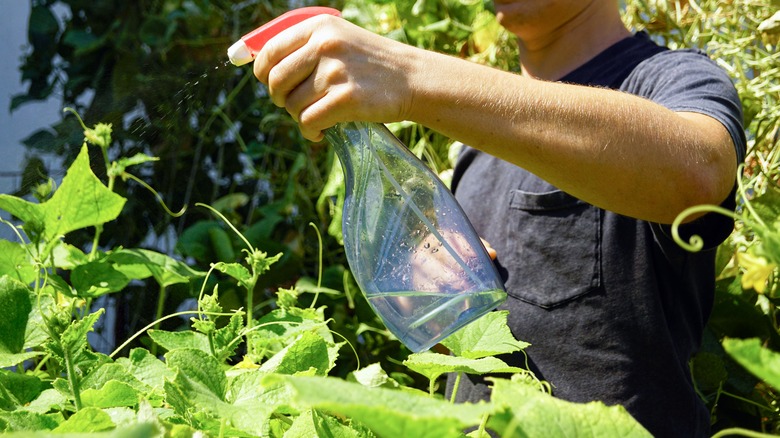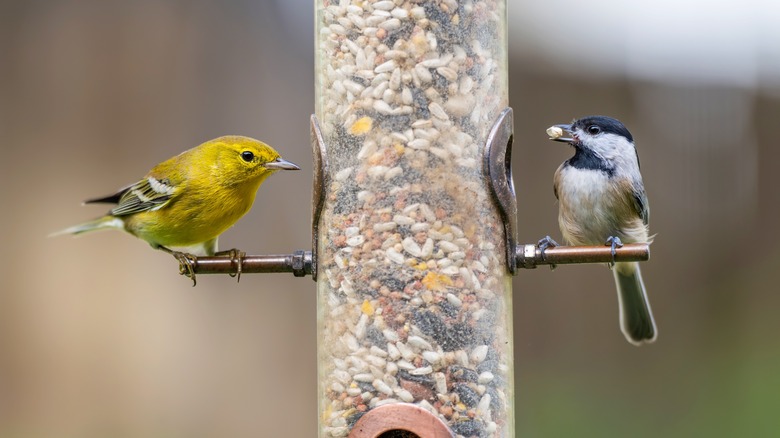The Downside Of Using Netting To Protect Your Garden
We may receive a commission on purchases made from links.
When I first started growing a large organic garden, I followed the philosophy of thirds: ⅓ to eat, ⅓ to donate, and ⅓ for Mother Nature. The challenge with this mindset is that, while we can control how much we eat and give away, we can't always manage how much is sacrificed to nature.
I love all creatures. Birds, squirrels, chipmunks, and rabbits are fun to watch, but I don't necessarily want them using my garden as their buffet. Although I don't want squirrels stealing my tomatoes or birds damaging my apples, I still don't want them to be injured in pursuit of a meal. For this reason, I won't use netting, such as the GreatBuddy Garden Netting on Amazon for $20, to protect my crops because I can't bear the thought of untangling a deceased creature from the small holes in a plastic net.
Since I actively keep my bird feeders full, I definitely don't want to lure birds into a trap of twisted netting in search of a sweet treat. And while I don't try to attract other small critters, they're around anyway, and I wish them no harm. Not only can any garden-dweller get caught in netting, but smaller pieces of the net could get picked up and used in nests or ingested. According to Bill Crisp, a licensed wildlife control operator, garden netting is among the most dangerous products used in home gardens (per the Wildlife Rescue League). Instead of using netting, let's talk about some humane ways to keep critters out of your yard.
Repellent alternatives to garden netting
Let's assume you aren't growing a garden simply to feed wildlife. You want your best harvest, but it's important to accept that it's impossible to prevent 100% of losses to wildlife. Going into gardening with the mindset that you will be sharing some of your homegrown food with critters can help ease frustration when it inevitably happens. That said, there are steps to take to safely protect your crops.
Repelling pesky critters is the least expensive option, like using peppermint oil to harmlessly repel birds. Strong or pungent scents like pepper or garlic sprays are cheap and easy to make, but they do require frequent reapplication — once a week or more depending on climate and rainfall. Naturally, this will only work on the fruits and veggies you can reach.
For small gardens or raised beds, a simple frame made of wood and stiff chicken wire is an inexpensive way to keep wildlife out without worrying about anything getting tangled in flexible netting. This is a particularly helpful option for keeping out squirrels, rabbits, and groundhogs if those are your primary enemies. The spacing of the holes in chicken wire won't keep all birds out, but they may help send those feathery friends toward more easily-accessible food choices.
Keeping critters from large trees and bushes
Fruit trees and bushes like apples, pears, and blackberries are particularly tempting to birds and squirrels. I cannot tell you how many times I've watched a squirrel run away with an apple from my tree, and watching my beloved birds enjoy my blackberries is frustrating. It may be the most tempting to use garden netting on large trees and shrubs since they're too big to cover with other types of barriers and too tall to be sprayed with repellents. However, you still shouldn't use netting on these larger plants to ensure that all critters are safe. If you choose to grow fruit trees and berry bushes, expect to share, and do what you can to tempt wildlife to go elsewhere for a meal.
I try to keep my birdfeeders full to attract songbirds and lure them away from my edible garden. Using a blend that includes dry fruit offers an easily accessible alternative for your feathered friends, and a fresh assortment of fruit near your feeder can also keep them from harvesting your homegrown food. When I have fruit that's past its prime, I leave it out for the birds.
Squirrels are harder to deal with. If you have a small tree, reusing mesh jewelry bags can help protect each individual fruit. Another option is to plant trees that are both ornamental and beneficial. Squirrels, birds, and other wildlife love the tiny fruits produced by crabapple trees, drawing them away from the fruit you actually want to eat.


